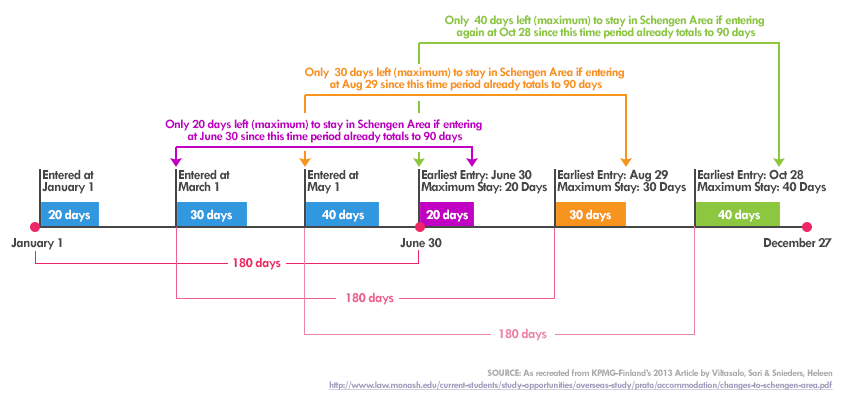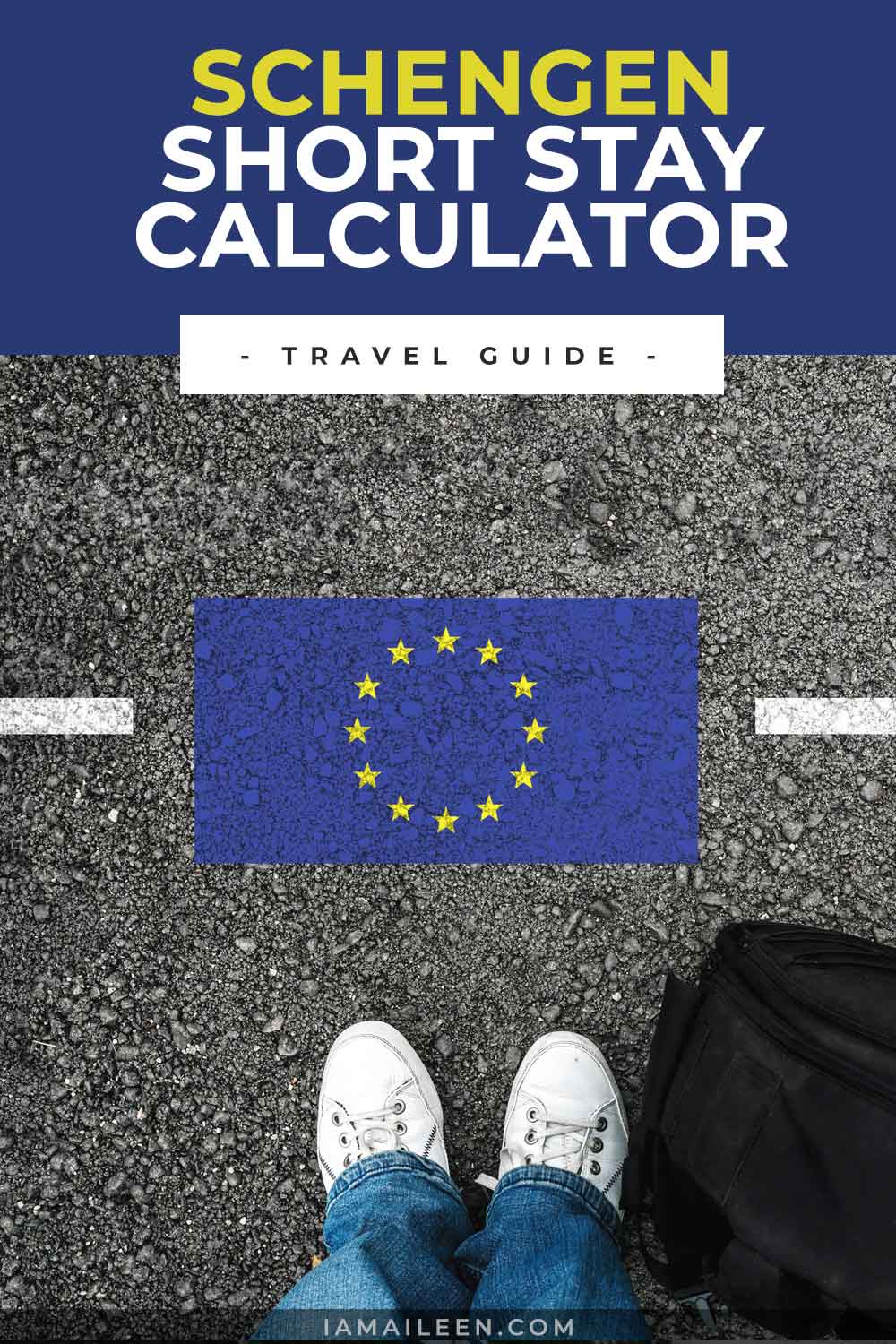If you are a non-EU (European Union) national who is planning to travel or are currently traveling in Europe’s Schengen Area with a tourist visa, you must pay special attention to your 90-day limit so as not to overstay your welcome. (Schengen Short Stay Calculator)
In fact, as of October 18, 2013, member states have agreed to redefine the concept and calculation of ‘short stay‘ in the Schengen Area and this change can truly affect your travel plans! It’s a piece of old news, but still, it seems like a lot of people do not know this yet (with some travelers being deported or fined). As such, I wanted to discuss this in more detail so you don’t encounter any problems during your Eurotrip!
Schengen Short Stay Calculator Update
OLD DEFINITION: Non-EU foreign nationals are only allowed to stay for a total of 90 days within a 180-day period from the date of 1st entry.
NEW DEFINITION: Non-EU foreign nationals are only allowed to stay for a total of 90 days within any given 180-day period.
- This ONLY applies to short-term business/tourist visas or ‘short stays’, regardless if you are a non-EU national that is visa-required or exempt. On the other hand, those who have a residence permit or are allowed to have a long-term stay in the Schengen Area (that is longer than 3 months) are NOT included in this rule.
…So, what does this mean? And what’s the difference…?
The basic rule that a short tourist stay NOT exceeding 90 days (3 months) remains, however, the way to calculate the length of 180 days (6 months) is the concept that has been changed.
– – –
In the old definition, non-EU nationals are allowed to enter Schengen for 90 days within each period of 180 days, wherein the 1st day is calculated from the date of the first entry.
Over the years, this had led to a lot of confusion and varying interpretations that resulted to:
- Unexpected entry denials by Schengen Countries
- Reduced duration of stay
- Non-EU nationals taking advantage of an ‘unclear’ rule
Regarding the 3rd bullet above, it is said to be typically done by those who are visa-exempted as well as those who are granted multiple-entry visas.
For you to better visualize how it worked, let’s take an example that is discussed in this article. Accordingly, “the old rule made it possible for a person to spend most of the 90-day period in the Schengen Area at the end of the 180-day period. [And then they will] enter again for another 180-day period and spend the allowed 90 days at the beginning of that new period.“
This is at the most extreme but apparently, some countries had allowed it because it’s how the old rule was phrased. To best illustrate this, see the diagram below:
You will clearly see how it can enable a non-EU national to stay in the Schengen period for almost a continuous 180-day period. They only have to leave the Schengen Area for probably a day or two (usually called a ‘reset’), spend it in a nearby European country that is not part of the Schengen territories (like the U.K.), and then come back in again to fulfill another period.
Often times, so as not to put it in such a severe way, some would do it like this:
Still and the same, it would seem like one can stay in the Schengen zone almost in a steady manner with only short breaks of exits in between.
– – –
With the new definition, the above scenarios are NO longer possible.
You can still country hop in Europe, alternating from one Schengen country to a non-Schengen one and then back to another Schengen country; however, you won’t be able to do it in such a quick and continuous manner.
Given the phrase ‘at any 180-day period‘, instead of calculating forward from the first date of entry into the Schengen Area as per the old rule, you will now have to calculate your 180 days by looking backward at each time you enter (or re-enter) the Schengen Area.
In a way, there is like this “moving 180-day reference period” that you have to consider.
Sounds confusing? Maybe the illustration below will make it clearer for you:
If you still find a hard time understanding this, you can always head to the European Commission’s official calculator for short Schengen Area stays where you can input your travel itinerary and it will confirm if you’re overstaying or not.
*You can also use this other calculator: [click]
• • •
Who is Affected by This?
As previously mentioned, this new rule ONLY affects non-EU foreign nationals (also called as third country nationals) that are:
- On a multiple-entry short-term business or tourist visa
- On a short-stay as a visa-exempted national (passport already serves as a ‘visa’)
The new rule does NOT apply to:
- Non-EU foreign nationals who are on a long-term or long-stay visa
- Non-EU foreign nationals who have a residence permit or any other long-term immigration permits
- EU / EEA (European Economic Area) nationals
> EU: Austria, Belgium, Bulgaria, Croatia, Republic of Cyprus, Czech Republic, Denmark, Estonia, Finland, France, Germany, Greece, Hungary, Ireland, Italy, Latvia, Lithuania, Luxembourg, Malta, Netherlands, Poland, Portugal, Romania, Slovakia, Slovenia, Spain, Sweden, and the UK.
> EEA: Includes EU countries (above) as well as Iceland, Liechtenstein, and Norway that are non-EU member states. Switzerland is neither an EU nor EEA member but it has the same rights as EEA countries therefore they are still a part of this group. - “Visa waiver agreements concluded by the EU with countries such as Antigua and Barbuda, The Bahamas, Barbados, Brazil, Saint Kitts, and Nevis, Mauritius, and Seychelles where the old definition (“3 months stay during a 6-month period following the date of first entry”) continues to apply.
If in case you are wondering what European countries are member states of the Schengen Area and who are the visa-exempted nationals, simply check this article wherein I have discussed all these things in detail.
NOTE: Another thing that you should know about is that the Schengen Area requires passports to be issued within the past 10 years and have at least 3 months of validity remaining beyond the intended date of departure from the Schengen Area.
• • •
What Happens if You Overstay?
As a general rule, anyone who overstays will be fined or deported — worst-case scenario is that the offender will be banned from the Schengen Area for a period of time (1 to 3 years) or even indefinitely!
So please make sure that you are fully aware of this new rule; share it as well with your friends who are planning on a ‘Eurotrip’ sometime soon.
Wanna stay longer in Europe LEGALLY?
Here is a comprehensive guide about the different ways you can properly stay in the Schengen Area longer.
NOTE: Every Schengen country has its own set of rules and policies; some would simply ask that you pay a fine, others would deport you, while the rest would ban you from entering. It is said that since it is a new rule, there are a few countries that are currently strict on checking and calculating your number of days (e.g. Slovenia, Germany, Belgium, and Greece). However, this does not mean that other countries won’t check — they might and they will, and as time passes, they will become stricter too, so it’s best that you abide by the law.
DISCLAIMER: It is your responsibility to ensure that the facts I have stated here are still up-to-date or true at the time that you read this Schengen short stay calculator article.
SOURCES:
• • •
Overall
I hope this article that discusses the Schengen short stay calculator will help you plan your EU itinerary!







Another great reason why borders should be abolished forever. It can happen sooner than later – just do what the great freedom thinkers throughout history have said to the effect – Be the change you wish to see in the world.
A very interesting and relevant article, thanks a lot! As a citizen of the EU I would also like to add that now Europe experiences a major immigrant crisis (as you may very well know), and I would suggest double-checking all the documents if you wish to enter Schengen area, as well as the requirements of entering in general. The reason for that is that in many countries that border non Schengen area countries border security is now much more strict and I think you’ll agree that it not very pleasant to be turned away at the border.
True that, Artwin. It’s very important to stay updated with current events too especially when it comes to any sort of entry into a foreign country.
So glad I’ve stumbled upon this article, Aileen! I’m still a little confused with the new policy, though.
I’m planning to visit Europe next April and will be staying in London for 4 months (hopefully). I’m planning to visit Schengen Visa countries during that period specifically: week upon my arrival, every other weekends (if possible), and three weeks on the 4th month. But with the new policy, my plan sounds impossible unless I get the 180-days?
Hey Kisty! As mentioned in the article, this rule only applies for those who can get a multiple-entry visa (short or long) so try to aim for that kind of visa so that you can get in and out of Schengen (usually visas are issued as single entry). So if you can only manage to secure a single entry visa, you will have to schedule a one time big time trip to Europe before coming back to London.
And once you secure the multiple-entry type of visa, what this new rule basically means is that for any given 180-day period, you can only stay for a total of 90 days in the Schengen Area (those days can be spent at any date). And the counting for the 180-day limit is for every “entry” instances that you make inside the Schengen area. (The above illustration should show you an example). Hope that clears it up? Let me know! :)
Interesting read, I am UE citizen so it doesn’t apply to me but I don’t like the idea of borders. Everyone should travel freely!
I agree! But the sad truth is, I don’t think borders will every be taken away so we really have to abide by the rules :(
Exactly Jowita. It’s just a way to control and corral people. If I have the money to support myself, and not be a burden, and I’m not a criminal I should be able to stay in any country indefinitely. We only have one planet. One life.
This is interesting. I live in Italy, and have for the past 4 years on and off (perm now) and I have only been legal as of last August. In my opinion, while their is legally and clearly a Schengen each country acts within it’s own right and there is A LOT of favoritism going on. As an American woman I never once met any conflict or raised eyebrows. I will admit that I have a toddler who was born an Italian citizen so should I have had to produce documents I could have – which is kept quiet but mothers (maybe fathers I don’t know) who have a child legal in the schengen are allowed to come and go (as long as you can prove documentations for the child). All that being said, I was NEVER asked to produce documents for my child or myself (although now that I’m 100% legal I basically flash it whenever I can because I worked so SO hard to get it!)…
Indeed, you’re right, Madaline. As I’ve also mentioned in this post, each Schengen country has its own way of checking migration so it’s best that everyone minds it. And that’s great to hear that you’ve secured yourself an EU visa! Congratulations! You truly deserve it :)